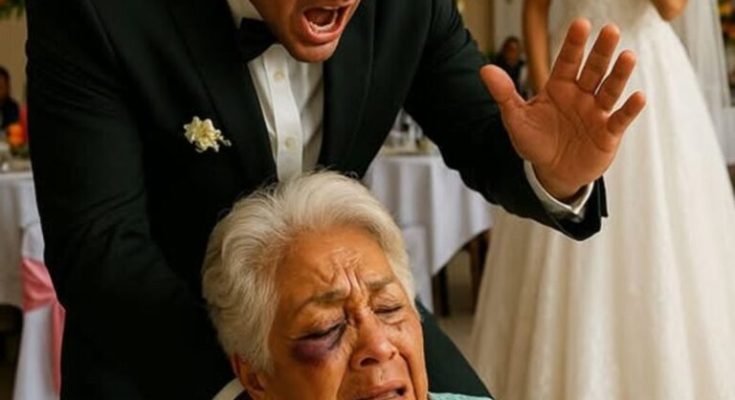Mercedes was seventy-four, a woman worn by decades of labor but still carrying herself with quiet dignity. She rose before dawn each day, not because she wanted to, but because age no longer allowed her deep rest. In her small, neat home, she brewed coffee on the old gas stove, filling the air with its bitter aroma—a simple ritual that reminded her that even after years of scrubbing floors, washing clothes, and cooking for others, small comforts still kept her going.
Her life had been dedicated to one purpose: her son Ernesto. With cracked hands and an aching back, she packed his lunches, paid his school fees, and dressed him as best she could. When he graduated high school, she thought her sacrifices had finally borne fruit.
But life often disappoints those who expect gratitude. Ernesto married Clara, a woman with a polished smile and a heart of disdain. From the beginning, Clara treated Mercedes with calculated cruelty. Her comments came wrapped in politeness, yet cut sharply: “Don’t strain yourself, Doña Mercedes. At your age, you could break.” Ernesto never defended her. He stayed silent, leaving his mother to swallow humiliation in silence.
The only light in Mercedes’s life was her grandson, Javier. The boy adored her, bringing sweet bread on Saturdays, repairing her roof, sweeping her yard, and filling her home with laughter. With him, she felt seen. But Clara resented that bond. She saw Javier’s loyalty as a threat, and her remarks grew colder, her visits more hostile.
Still, Mercedes endured. She kept her home spotless, her garden blooming with bougainvillea, as if hoping Ernesto might one day see her again as the mother who gave him everything. That day never came.
Instead came a wedding celebration—Ernesto and Clara renewing their vows. The invitation felt more like obligation than love, but Mercedes decided to go for one reason: Javier. She put on her best skirt, a pressed blouse, and a shawl she had knitted years ago. Not fashionable, but dignified.
The reception hall sparkled with chandeliers and perfumed flowers. Yet Mercedes was placed near the kitchen, far from the laughter. Guests whispered behind manicured hands. She sat upright, her embroidered handkerchief folded neatly in her lap. Javier’s warm greeting reminded her why she came.
But Clara and Ernesto made sure she felt excluded. Clara’s remarks about “older people tiring easily” and her icy smile pierced deep. Still, Mercedes kept her composure.
Then came the moment that would change everything. During the ceremony, Mercedes praised Javier, calling him a gentleman like his grandfather. Clara sneered, twisting her words into insult. Ernesto snapped. “Why do you always have to say something?” he barked. And then, in front of everyone, he shoved her.
Mercedes staggered backward. Her shawl slipped from her shoulders as she struck the floor with a thud that silenced the room. Glasses rattled. The music cut off mid-note. Whispers spread like fire. Pain burned through her hip, but the humiliation was worse. Javier rushed to help, but Clara blocked him coldly, insisting Mercedes had “just tripped.”
No one defended her. Not her son. Not his wife. Not the guests who saw everything.
With the help of a waiter, Mercedes rose, gathered her shawl, and returned to her lonely table. She drank her water in silence, her dignity shaken but unbroken. Later, she left the hall alone. The city lights blurred through her tears, but her steps remained steady. At home, she wrote in her notebook: “No one defended me. But I will not forget.”
What happened next surprised everyone.
A guest’s video of the incident spread quickly through neighborhood chats. It showed Clara sneering, Ernesto’s shove, and Mercedes’s fall. This time, the whispers weren’t about her—they were about them. Neighbors turned cold. The butcher served them without a smile. At church, pews emptied beside them. Their reputation crumbled.
Javier refused to let it end there. With the help of a lawyer, Camila, he gathered deeds, receipts, and witness statements proving Mercedes’s rightful ownership of her home—the very thing Clara had long tried to seize. In court, the ruling was clear: the house belonged to Mercedes. Any attempt to evict her would be punished by law. Ernesto’s assault was recognized for what it was.
For Mercedes, this was more than property—it was dignity. Clara, disgusted by the public disgrace, packed her bags and left Ernesto. He was left behind, shamed and alone, to face the echo of his own actions.
Javier moved in with his grandmother. Together, they filled the home with the smell of beans, coffee, and fresh bread. They fixed bulbs, planted flowers, and rebuilt their lives one quiet day at a time. Neighbors who once whispered now knocked with gifts of tortillas and fruit—not out of pity, but out of respect.
One evening at dinner, Mercedes looked at Javier and said softly, “I was knocked down, but I rose again. And now, son, we are home.”
Javier squeezed her hand, silently promising she would never face silence again.
Outside, neighbors gathered, applauding gently—as if to seal the truth: real strength isn’t in avoiding pain, but in rising with dignity after being pushed to the ground. Mercedes had risen, and this time, she would never fall alone.



